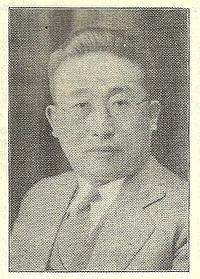Views
Yù Huìguān 玉慧觀 (1891-1933)
|
| Notable Associates: |
|
Yù Huìguān 玉慧觀 (1891-1933) was a Korean-born Chinese businessman, politician, and lay Buddhist.
Biography
Yù's family originally came from Kūnmíng 昆明, but his parents had moved to Pyongyang 平壤 for business reasons. He studied in Korea at a college started by the Japanese colonial government. He engaged in some kind of revolutionary activity while in school. Eventually he was imprisoned at age 19 for starting a revolutionary newspaper with an Englishman. In prison he studied politics, economics, and literature. When he got out of prison, he gave up radical activities and through family connections became assistant manager at a bank. Then he went on to start his own lumber company, but owing to his past activities he had difficulty with the the Japanese authorities.
Yù moved to China in 1919. Never severing his connection with Korean-born Chinese radicals, he eventually went to work in Shànghǎi 上海 at the American-founded Sāndé 三德 Bank.
In November of 1926, at the invitation of Lǐ Guībái 李佳白 Yù attended a lecture given by Tàixū 太虛. The lecture was titled "How the Buddha-dharma Should be Spread in the Modern Modern World (Fófǎ yīng rúhé pǔjí jīnshì 佛法應如何普及今世)". Yù was so impressed with the talk and with Tàixū’s attack on Christian creationism, that he converted from Christianity to Buddhism, taking the refuges under Tàixū. Subsequently he began reading extensively in Buddhism.
In 1928, Tàixū returned to Shànghǎi and introduced Yù to certain Japanese Buddhists (such as Japanese literary scholar Yamada Kenkichi 山田謙吉) hoping they would make a world Buddhist library in Shànghǎi (such a library was constructed several years later in Wǔchāng at the World Buddhist Institute 世界佛學苑). The following year, Yù became a member of the domestic government as a representative for Kūnmíng. He also joined the Kūnmíng Association, as well as the Overseas Chinese Mutual Support Association, he also contributed articles to the magazine Guómín gōnglùn 國民公論.
In 1930, Yù and two friends opened the Buddha's Compassion Pharmaceuticals Factory 佛慈藥廠 which sought to use scientific methods to make medicine. This venture included both the factory and a clinic for treating the poor. Yù became a representative in the Chinese Buddhist Association 中國佛教會 in April, 1931. That year he and Dù Dǒng 杜董 provided the entire funds of 400 yuan for the operation of the Hǎicháo yīn 海潮音 [1] Yù was killed by robbers in Shànghǎi on August 1, 1933.
References
- Yú Língbō 于凌波. Zhōngguó jìnxiàndài fójiào rénwù zhì 中國近現代佛教人物志. Běijīng 北京: Zōngjiào wénhuà chūbǎnshè 宗教文化出版社, 1995. Pp. 578-581.
- Yú Língbō 于凌波, ed. Xiàndài Fójiào rénwù cídiǎn 現代佛教人物辭典 (A Dictionary of Modern Buddhist Persons), 2 vols. Taipei: Foguang, 2004. Pp. 1.261b-6a.
